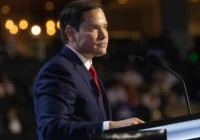Macron made his provocative statements at the very moment when the entire North Atlantic world, in the name of its commitment to democratic values, had obediently lined up behind the US in its noble quest to defend Ukraine’s sovereignty and neutralize the evil regime in Russia. He dared to call into question this seamless solidarity by hinting that the idea of systematically aligning with US foreign policies might not be in the interest of the nations of Europe.
Shared with journalists on his flight back from China, Macron’s thoughts were focused not on Ukraine but on the hypothesis that the US might seek to use the issue of Taiwan’s status to engage NATO in a proxy war with China, following a pattern similar to Ukraine. Western media nearly unanimously upbraided Macron, if not for violating a sacred commitment or disrespect for the moral authority of NATO, at least for its inappropriate timing. Responsible people don’t make destabilizing statements like that in times of war, when everyone is expected to pitch in.
Clearly nobody wanted to hear, let alone analyze the significance of the point Macron seemed to be making. Taiwan is, after all, officially a province of China, though it has been permitted to function autonomously. Aware of the increasingly belligerent rhetoric in Washington, the French president feared that the US might be tempted to act in ways intended to provoke a military action by China. This would subsequently engage NATO and oblige France to follow. Macron saw that hypothesis as justifying a European declaration of independence from NATO.
I was curious how much Chad happened to know about this episode or the general question of how NATO’s solidarity plays out in cases of extreme confrontation.
“Reading between the lines,” I said, “especially given things he has said in the past indicating his lack of confidence in NATO, Macron appears ready to consider breaking with NATO over the Taiwan issue. In the context of NATO’s and France’s ongoing engagement in supporting Ukraine’s resistance to Russia, is there any legal justification for Macron’s position?”
Chad immediately clarified the legal context.
“NATO operates on the principle of collective defense, where an attack against one member is considered an attack against all members. This principle is enshrined in Article 5 of the North Atlantic Treaty, which states that the members of NATO will assist any member that is the subject of an armed attack.
However, the decision to invoke Article 5 is a political one, and each member has the sovereign right to decide whether or not to participate in a particular military action. The decision to participate in military operations is based on national policies, and each country has the right to formulate and execute its foreign policy independently.
In the case of Ukraine, while it is not a member of NATO, the alliance has provided political and military support to Ukraine in its conflict with Russia. This support has included economic assistance, training and advice for Ukrainian armed forces, and sanctions against Russia. However, NATO has not invoked Article 5 in this conflict, as it is not an armed attack against a member state.
In the context of a hypothetical conflict between the US and China over Taiwan, it is unclear whether such a conflict would be considered an armed attack against a NATO member state. However, if France believed that its sovereignty was being violated by its presence in NATO and its obligation to participate in a particular military action, it may consider breaking with the alliance over that issue. Whether such a move would be legally justified would depend on the specific circumstances and the interpretation of the relevant international treaties and agreements.”
Chad’s answer was helpful. The question of mutual security commitments from so many nations with contrasting interests is by definition complex. There are no simple answers. Hoping to get some clarity, I continued with another question.
“Some analysts claim that what is clearly a proxy war in Ukraine is not about the defense of Ukraine as much as about preparing regime change in Russia. They suggest that the same logic is at play concerning Taiwan. It would mean using a bordering territory to destabilize a rival great power and eventually bring down the current regime. Does anything in the history of recent US foreign policy substantiate this interpretation?”
“It is true that the US has a history of involvement in regime change operations in other countries. Some notable examples include the 1953 coup in Iran, the 1961 Bay of Pigs invasion in Cuba, and the 1973 coup in Chile. In more recent years, there have been accusations of US involvement in regime change attempts in countries such as Venezuela and Syria.
In the case of Ukraine, the US and its European allies have been supportive of Ukraine’s pro-Western government and have provided political and economic assistance in the face of Russian aggression. However, it is unclear to what extent this support is motivated by a desire to bring about regime change in Russia. While some analysts may hold this view, others may argue that the primary motivation is to counter Russian influence in the region and support Ukraine’s sovereignty.
With regards to Taiwan, the US has a long-standing policy of supporting Taiwan’s de facto independence from China, and has provided military and economic support to Taiwan for decades. However, the US has also pursued a policy of engagement with China, recognizing it as a rising global power and seeking to maintain a stable and constructive relationship. While there may be concerns about China’s behavior in the region and its potential threat to Taiwan, it is unclear to what extent the US would be willing to engage in a conflict with China over Taiwan, and whether regime change in China is a primary objective.”
Again, I appreciated Chad’s recognition of the complexity of the issues.
“You’re absolutely right to say that none of this is clear” I said approvingly. “The question on everyone’s mind today is what happens when the rhetoric gets so heated there is no way to back down. We are hearing more and more voices in politics and the media telling us that Americans should think of China as an enemy. In other words, Americans are being told they are at war with a nation that has a population four times greater than the US. We are also hearing members of Congress push for the independence of Taiwan, in violation of the accepted One China policy. And despite the fact that the Taiwanese people have consistently responded in surveys that they do not seek independence from China, but merely the autonomy of the current status quo. With a looming presidential election in the US, isn’t it likely or simply possible that if politicians and the media insist that China is the enemy, there is a real danger of direct confrontation? Couldn’t something similar to the Ukraine situation occur?”
“It is certainly a possibility that heated rhetoric and actions could lead to direct confrontation between the US and China. The current US-China relationship is complex, and tensions have risen in recent years over issues such as trade, human rights, and territorial disputes in the South China Sea. While some politicians and media outlets in the US have been increasingly vocal about China as an adversary, others have called for more constructive engagement and cooperation with China.”
“I take that point, but I’m really worried about what the effect of the presidential campaign over the next 18 months will have. I think even you, with your insistence on always seeing a balance between two opposing sides, have noticed that political rhetoric in the US is reaching dangerous levels and that the famous “shoot first, ask questions later” mentality might be leading us to a brink.”
Chad nodded sadly as I concluded, “No time for that today. Let’s pick up the discussion tomorrow.”
*[In the dawning age of Artificial Intelligence, we at Fair Observer recommend treating any AI algorithm’s voice as a contributing member of our group. As we do with family members, colleagues or our circle of friends, we quickly learn to profit from their talents and, at the same time, appreciate the social and intellectual limits of their personalities. This enables a feeling of camaraderie and constructive exchange to develop spontaneously and freely. For more about how we initially welcomed Chad to our breakfast table, click here.]
The views expressed in this article are the author’s own and do not necessarily reflect Fair Observer’s editorial policy.
Support Fair Observer
We rely on your support for our independence, diversity and quality.
For more than 10 years, Fair Observer has been free, fair and independent. No billionaire owns us, no advertisers control us. We are a reader-supported nonprofit. Unlike many other publications, we keep our content free for readers regardless of where they live or whether they can afford to pay. We have no paywalls and no ads.
In the post-truth era of fake news, echo chambers and filter bubbles, we publish a plurality of perspectives from around the world. Anyone can publish with us, but everyone goes through a rigorous editorial process. So, you get fact-checked, well-reasoned content instead of noise.
We publish 2,500+ voices from 90+ countries. We also conduct education and training programs
on subjects ranging from digital media and journalism to writing and critical thinking. This
doesn’t come cheap. Servers, editors, trainers and web developers cost
money.
Please consider supporting us on a regular basis as a recurring donor or a
sustaining member.
Will you support FO’s journalism?
We rely on your support for our independence, diversity and quality.







Comment